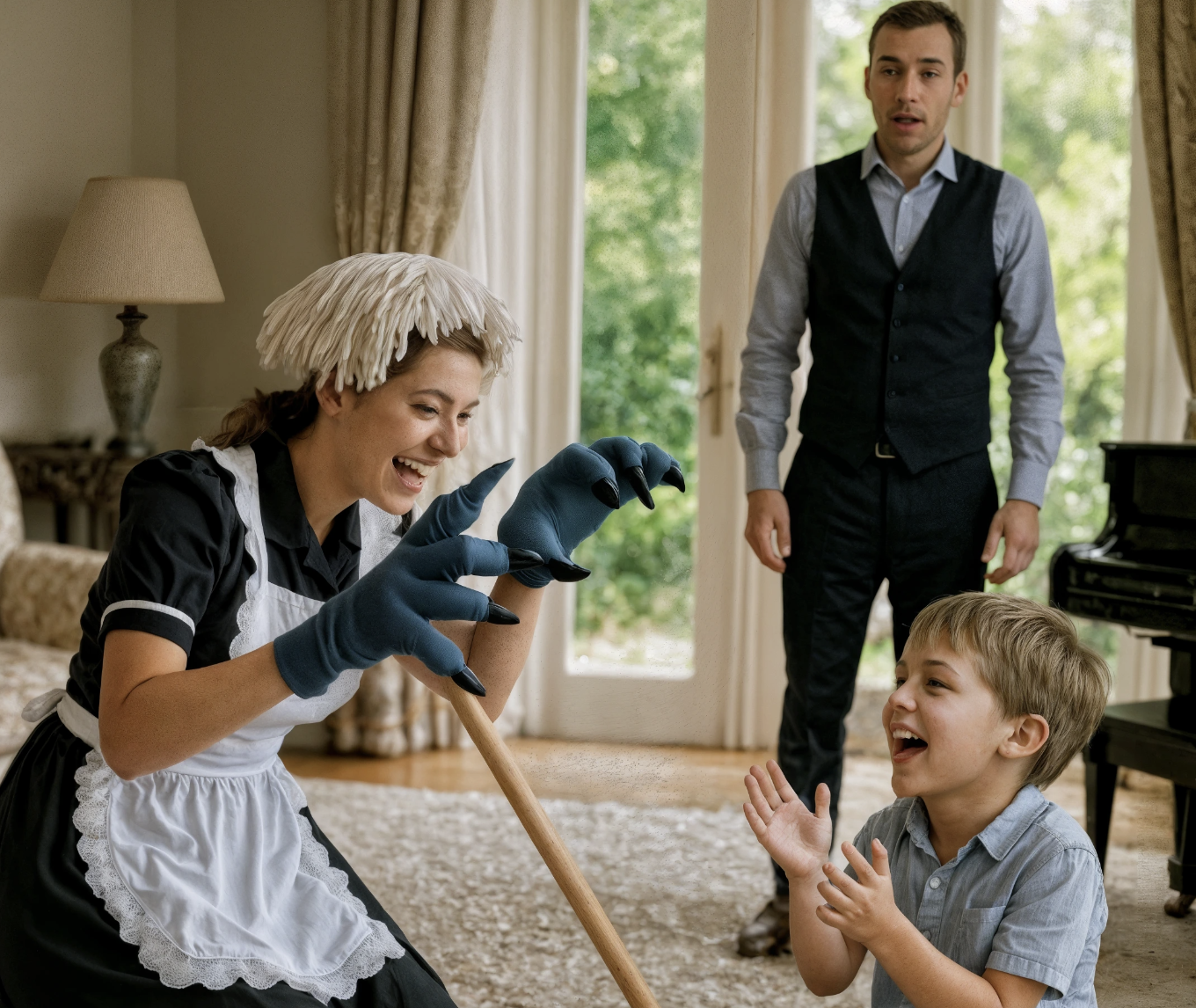Thomas Caldwell was a millionaire enjoying a lifestyle many only dream about: vast estates, luxury cars, a private jet, and a mansion reminiscent of a regal palace. Yet after the passing of his wife Emily two years prior, all these possessions lost their sparkle. The grand chandelier no longer gleamed, the hall’s piano gathered dust, and most heartbreakingly, his five-year-old son Lucas had not uttered a single word since the funeral.
Before tragedy struck, Lucas had been an intelligent child, always inquisitive and full of laughter. However, the sudden loss of his mother in a car accident shattered something deep within him. Since then, he withdrew into silence, communicating only through gestures and sketches. Overwhelmed by grief, Thomas immersed himself relentlessly in work, constantly traveling to avoid the very place that should have been a sanctuary: his hollow home.
Thomas hired a series of housekeepers and nannies to look after his son and household, but none stayed long. Lucas did not respond to any caregiver — until Clara arrived. A young woman in her twenties, Clara was unassuming and modest, distinguished only by her gentle smile and tender nature. Wearing secondhand clothes and keeping her hair in a simple braid, she initially went unnoticed by the household, except by Lucas.
Unlike others, Clara never pressured Lucas to speak. She did not treat him as if broken. Instead, she made funny faces, theatrically read storybooks aloud, and left hand-drawn notes on his pillow saying things like, “It’s okay to be sad; even clouds shed tears.” At first, Lucas simply observed her from afar. Gradually, he started following her around the house, sitting nearby as she cleaned, tugging at her apron when she hummed softly, and occasionally drawing her with colored pencils, always accompanied by a small smile.
- Clara’s gentle approach created a safe space for Lucas.
- She communicated through warmth, not words.
- Her patience allowed Lucas to open up in his own time.
One rainy afternoon, Clara built a fort out of sheets in the living room, inviting Lucas inside. Together, they ate cookies and pretended to be explorers hiding from jungle creatures. Lucas laughed—a single, precious moment—while Clara smiled and whispered, “That laughter is pure magic.” Something inside Lucas was beginning to heal, though Thomas remained oblivious. Business trips to Hong Kong, Dubai, and London continued to take him far away, unaware that the most crucial healing was quietly unfolding at home.
Then, quite unexpectedly on a Wednesday, Thomas returned home earlier than planned without prior notice. A board meeting in Geneva concluded sooner than expected, and he suddenly felt a strong urge to see his son. He stopped by a luxury store and bought a limited-edition miniature Italian car Lucas had once glimpsed in a catalog. Hoping to reconnect, he entered through the servant’s door, holding the toy in one hand and his briefcase in the other.
No staff greeted him; he had sent them away the previous afternoon. Yet what met his eyes froze him in place. In the center of the grand living room, Clara was pretending to be a roaring dinosaur, with a mop tied around her head as a mane. Lucas laughed uncontrollably, tears of joy sparkling in his eyes. Clara wasn’t merely playing; she was performing—growling, staggering, roaring again, then collapsing onto the floor like a defeated dragon. Lucas crawled over and wrapped his arms tightly around her neck.
And then came the moment that shattered Thomas’s guarded heart—Lucas softly whispered, “Mama.” The tiny toy car slipped from Thomas’s hand, clattering onto the floor. Clara turned abruptly, surprised. Lucas lifted his gaze, startled. Thomas did not yell or question. Instead, he knelt beside his son and hugged him tremblingly.
“He called you mama,” Thomas said with a broken voice.
Tears welled in Clara’s eyes. “I didn’t teach him to say that. It just started a few days ago. I tried to gently correct him…”
For the first time, Thomas looked into Clara’s eyes not as an employer, but as a grateful father. Something long frozen began thawing—the barrier, the distance, the coldness.
Thank you,” he whispered, “for bringing my son back to me.”
In the following days, Thomas genuinely stayed home. He joined Clara and Lucas for spontaneous picnics in the garden. He watched as Clara guided Lucas through baking cookies, despite the flour scattering wildly throughout the kitchen. Gradually, Lucas spoke more—first softly, then in full sentences. His drawings transformed, depicting smiles, sunshine, and stick figures holding hands. Thomas realized he hadn’t just hired a housekeeper; unknowingly, he had welcomed a healer into their lives.
One night, Clara discovered a letter on her pillow. It read: “Dear Clara, you are not simply the woman who helped my son feel again; you reminded me what it means to be a father. Please don’t think of this as just a job anymore. I wish for you to remain not only in this house but in our family.”
Months later, the villa no longer resembled a lifeless museum. Instead, it brimmed with warmth, laughter, and affection. Seated on the front steps watching the sunset, Lucas rested his head on Clara’s shoulder and asked,
“Can I call you Mama Clara forever?”
Clara glanced at Thomas, who nodded with tears glistening in his eyes. Holding Lucas close, she replied,
“You already do, sweetheart.”
- Wealth can construct grand homes.
- Love, however, builds families.
- True healing often stems from kindness and patience rather than riches.
The most shattered hearts may mend through simple human connection. Never underestimate quiet souls; they often harbor the brightest miracles.
In conclusion, the Caldwell family’s story poignantly illustrates how compassion and gentle perseverance can revive lives shadowed by grief. While material wealth surrounds them, it was the warmth of a humble caregiver that rekindled joy and communication within their once-silent home. This narrative serves as a powerful reminder that true happiness arises not from possessions but from empathy and shared humanity.
